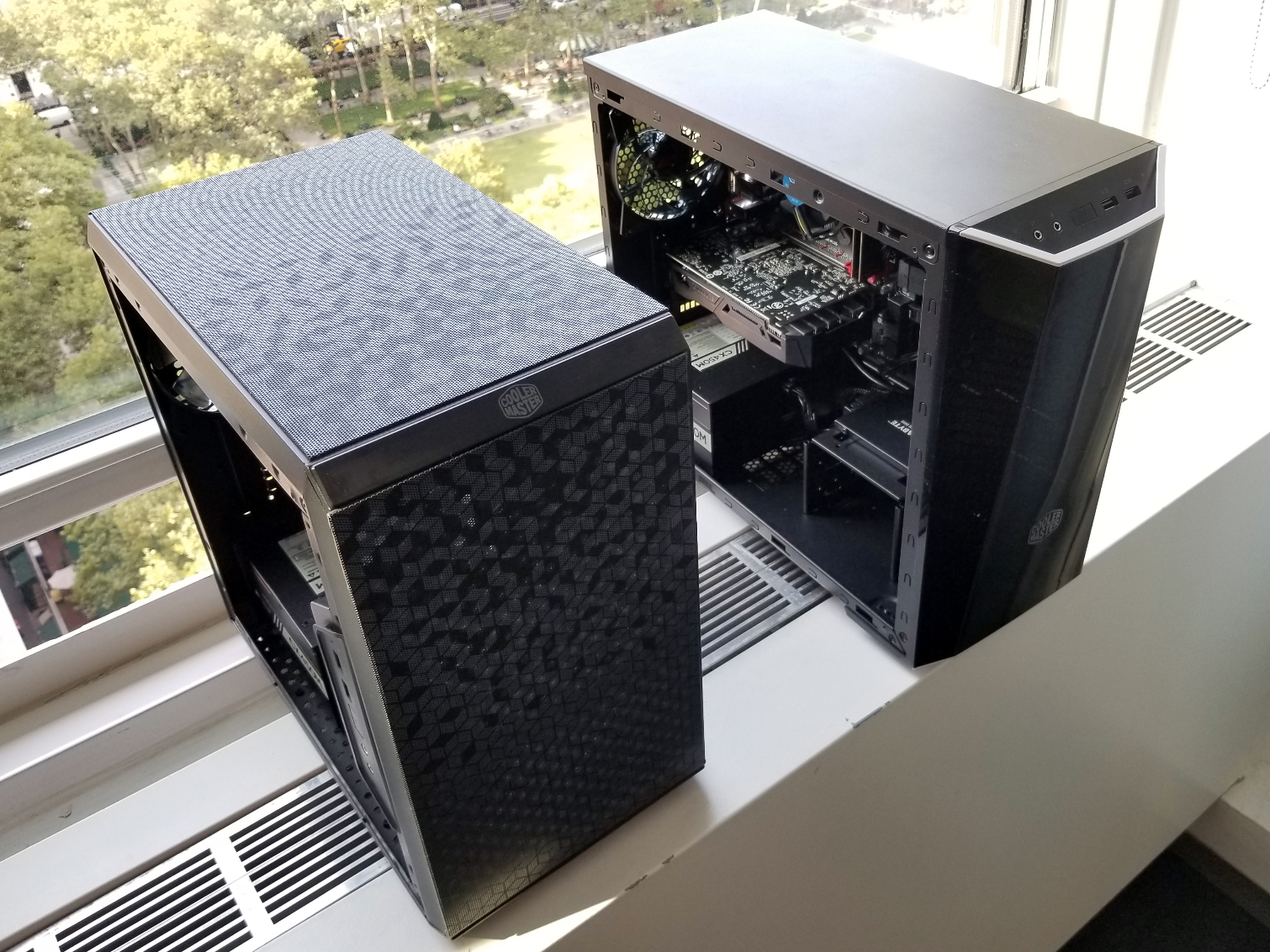AMD vs. Intel: Which PC Build is Better for Under $500
Conclusion
There’s no denying that the GTX 1050 is more powerful than the Vega 11 graphics in AMD’s Raven Ridge Ryzen 5 2400G, with the dedicated card often delivering more than twice the frame rates as the AMD chip and its integrated graphics. And while you can overclock the Vega graphics on the Ryzen chip, you aren’t going to achieve GTX 1050-level performance--even if you opt for a cooler that’s better than the one AMD ships in the box. But the extra cores and threads of the AMD chip easily surpass what the Pentium Gold G5400 is able to deliver in terms of CPU/productivity performance.
All that said, opting for the Intel machine with a $70 CPU and $140 graphics card, while it will deliver higher frame rates, left us with less money to spend on storage while sticking to our $500 build budget. The 256GB SSD we had to opt for with the Intel/Nvidia build simply isn’t roomy enough to recommend for gamers in these days of AAA titles that are ballooning up to and above 100GB. We think that makes the AMD system a more well-rounded build, and once you dial back some in-game settings it's still plenty capable of 1080p gaming at reasonably smooth frame rates--especially if paired with an affordable FreeSync monitor.
In short, we’d say if you have to spend $500 or less on a complete gaming PC and also frequently do tasks like video editing that take advantage of all available CPU cores, the AMD build with a Ryzen 5 2400G is easy to recommend. But if you have more money to spend on storage--even as little as $30 more than our $500 limit--opting for a dedicated card like the Nvidia GeForce GTX 1050 or AMD Radeon RX 570 will give you better frame rates for a smoother gaming experience without having to fiddle with any overclocking settings.
Lastly, when we parted out these systems, Intel’s low-cost Pentium G5400 was an easy choice for capable computing in the sub-$100 range when paired with a dedicated card. But AMD fans (or those who just want to spend a little less money on their processor) will soon have an interesting new option in the dual-core, four-thread Athlon 200GE.
That brand-new AMD budget chip wasn’t yet available when we wrote this, so we haven’t had a chance to test it. But its $55 MSRP, combined with a low-cost motherboard and some recent price dips on SSDs and mainstream graphics cards, should soon make it possible to build a $500 system with a GTX 1050 Ti. As we wrote this, that card starts at about $150, and will deliver better performance than the Gigabyte GTX 1050 in our Intel test build here.
That’s the good thing about PC components. As time passes, prices tend to fall while newer parts enable better performance at a lower price. That’s the way it’s supposed to work, anyway, so long as pesky things like cryptomining, fab shortages, or trade tariffs don’t get in the way.
MORE: Best PC Builds
Get Tom's Hardware's best news and in-depth reviews, straight to your inbox.
MORE: How To Build A PC
MORE: All PC Builds Content
After a rough start with the Mattel Aquarius as a child, Matt built his first PC in the late 1990s and ventured into mild PC modding in the early 2000s. He’s spent the last 15 years covering emerging technology for Smithsonian, Popular Science, and Consumer Reports, while testing components and PCs for Computer Shopper, PCMag and Digital Trends.
-
ikaz I think most people who frequent this site already knew the answer igpu vs gpu. I think what would be an interesting would be to see how cheap you can make AMD vs Intel. Trying to keep them as close as possible with cost, maybe a 2200G vs pentium+1030 GT (though probably still faster) and what the cost difference would be. Then say put in a high end card to see which one bottlenecks quicker. That way if some one is building a PC now but doesn't have the money for say 1060/580 but plan to add one later they can see which is a better long term CPU build or if it even matters if they plan on upgrading the CPU long with the GPU.Reply -
Math Geek very interesting article.Reply
i like the extra space of the AMD build for sure over the intel build. but i also know that an ssd is not essential to me at lower budgets and i'd easily drop a large hdd in place of it to stay on budget with the intel build. little bit of load time loss would be well worth fixing the anemic amount of storage space currently in there. dropping 1-2 tb hdd in there for the same money makes the system much more viable. the ssd can come later when some extra cash is on hand to add the upgrade :)
also like to see about the future upgrade path when better gpu is added in down the line. perhaps something like a 1060 or so would be interesting to see how it performs with the budget cpu's for that person thinking down the line but also wants to get started now.
but the rest seems like good choices made for the low budget builder. -
tikal Such a useless and biased article. And to have the never to write INTEL vs AMD on the chart, when INTEL based PC and dedicated GPU. Are you paid for this kind of reporting?Reply -
WildCard999 Why go with a 500gb SSD anyways when you can easily go 240/250gb with a 1TB HDD for the same price? Most of your games won't benefit from being on a SSD.Reply
https://pcpartpicker.com/list/KGtLfH -
Math Geek Reply21369691 said:Such a useless and biased article. And to have the never to write INTEL vs AMD on the chart, when INTEL based PC and dedicated GPU. Are you paid for this kind of reporting?
care to elaborate on how it is biased? budget was set, parts were picked within that budget and compromises were made on both systems to stay on budget. so how exactly is it biased? i prefer AMD myself but can't find fault other than storage choice for the intel build, which is more a personal preference than anything. -
Krazie_Ivan Reply
the smaller SSD+HDD argument makes even more sense with the AMD platform due to StoreMI... it uses so little SSD space, while making games & apps stored on the HDD load at about the same speed they would if stored on the SSD alone. huge value in that software, but not often noted by the tech press.21369700 said:Why go with a 500gb SSD anyways when you can easily go 240/250gb with a 1TB HDD for the same price? -
SkyBill40 Good lord, Matt. Who proofed this before it was published?Reply
That said, naturally the machine with the discrete graphics solution is going to win out against an iGPU even as good as the one on the 2400G. Unless you're comparing like for like, this doesn't make much sense to me. Come on, man. You guys can and should do better than this. -
Paul Alcorn Reply21369746 said:Good lord, Matt. Who proofed this before it was published?
That said, naturally the machine with the discrete graphics solution is going to win out against an iGPU even as good as the one on the 2400G. Unless you're comparing like for like, this doesn't make much sense to me. Come on, man. You guys can and should do better than this.
I think quantifying the difference between the two builds is important. How much do you give up with integrated graphics, but also, what do you gain if you use them?
Do these tests answer a question that directly impacts the readers' purchasing decision? I think they do. -
SkyBill40 Reply21369766 said:21369746 said:Good lord, Matt. Who proofed this before it was published?
That said, naturally the machine with the discrete graphics solution is going to win out against an iGPU even as good as the one on the 2400G. Unless you're comparing like for like, this doesn't make much sense to me. Come on, man. You guys can and should do better than this.
I think quantifying the difference between the two builds is important. How much do you give up by using integrated graphics, but also, what do you gain? Are these tests useful and answer a question that directly impacts the readers' purchasing decision? I think they do.
I get that, Paul. If that is the case, then why not build four systems? Two each using integrated solutions and two using discrete cards. That seems a more fair and complete test in my opinion. Meh, what do I know. :/ -
Paul Alcorn Reply21369785 said:21369766 said:21369746 said:Good lord, Matt. Who proofed this before it was published?
That said, naturally the machine with the discrete graphics solution is going to win out against an iGPU even as good as the one on the 2400G. Unless you're comparing like for like, this doesn't make much sense to me. Come on, man. You guys can and should do better than this.
I think quantifying the difference between the two builds is important. How much do you give up by using integrated graphics, but also, what do you gain? Are these tests useful and answer a question that directly impacts the readers' purchasing decision? I think they do.
I get that, Paul. If that is the case, then why not build four systems? Two each using integrated solutions and two using discrete cards. That seems a more fair and complete test in my opinion. Meh, what do I know. :/
You know a lot, eight badges! You make a fair point about testing multiple systems. I am working on the Athlon review, though. It has pretty decent Vega graphics for its price point, so you know we'll be testing them. Also, I'll test it with a GPU so we can see how it fares against the rest of our recommended cheap chips. The 2400G, 2200G, and Pentiums are in the test pool. We'll be testing both integrated and discrete there, too, so maybe that will help.

